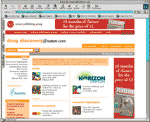TABLE OF CONTENTS
|
10 February 2012 |
 |  |  |
 |  News News
 Analysis Analysis
 Research Highlights Research Highlights
 Research & Reviews Research & Reviews
 Careers Careers | |
Nature Reviews Drug Discovery is on Twitter |  |
 |
 |
| Advertisement |
 |
Nature Reviews Cancer
POSTER - Proteasome inhibition and cancer therapy
Author: Q. Ping Dou
This poster highlights recent achievements and progress in targeting the ubiquitin-proteasome degradation pathway for cancer therapy.
Access the Poster FREE online!
www.nature.com/nrc/posters/proteasome
This Poster is freely available thanks to sponsorship from
Onyx Pharmaceuticals, Inc. | |
 |
| |
News |  Top Top |
 |
 |
 |
Drug bests cystic-fibrosis mutation
doi:10.1038/482145a
First treatment to tackle protein behind the disease wins approval - but only a small fraction of patients will benefit.
Full Text |
 |
 |
 |
Experimental project gives big pharma its youth back
doi:10.1038/nature.2012.9979
GlaxoSmithKline's Discovery Performance Units strive to provide the advantages of a smaller company.
Full Text |
 |
 |
 |
Patent Watch: Regeneron and Genentech's VEGF trap dispute settles... and continues
doi:10.1038/nrd3667
A round-up of patent-related news, including the outcome of Regeneron’s patent dispute with Genentech over Eylea (aflibercept).
Full Text |
 |
 |
 |
An audience with RuiPing Dong
doi:10.1038/nrd3668
RuiPing Dong, head of emerging markets R&D at Merck & Co., discusses the strategy behind the firm's recent US$1.5 billion expansion into China.
Full Text |
 |
Analysis |  Top Top |
 |
 |
 |
Browning fat
doi:10.1038/scibx.2012.114
Ember Therapeutics has licensed findings that irisin converts white fat into brown-like fat in mice, and is generating stabilized irisin variants for obesity and type 2 diabetes, while a team that has developed a method for converting human pluripotent stem cells into white and brown adipocytes is collaborating with Roche to screen for molecules that induce or activate brown fat.
Full Text |
 |
 |
 |
Fresh from the Pipeline: Ruxolitinib
doi:10.1038/nrd3652
In November 2011, ruxolitinib (Jakafi; Incyte/Novartis), a small-molecule inhibitor of Janus kinases, was approved by the US Food and Drug Administration for the treatment of patients with myelofibrosis.
Full Text |
 |
 |
 |
From the analyst's couch: The neuropathic pain market
doi:10.1038/nrd3624
This article discusses the drug pipeline for neuropathic pain, for which the market is forecast to grow by 50% by 2020.
Full Text |
 |
Research Highlights |  Top Top |
 |
 |
 |
Drug delivery: Encapsulation improves therapeutic stem cell action
doi:10.1038/nrd3661
Therapeutic stem cells encapsulated in a biodegradable synthetic extracellular matrix show promise in mouse models of human glioblastoma surgical resection.
Full Text |
 |
 |
 |
Anticancer drugs: Keeping one step ahead
doi:10.1038/nrd3664
A recent study proposes a new drug combination strategy to target drug-resistant chronic myeloid leukaemia.
Full Text |
 |
 |
 |
Psychiatric disorders: Why two is better than one
doi:10.1038/nrn3181
The antidepressant fluoxetine increases synaptic plasticity in the amygdala and thereby facilitates fear erasure through extinction.
Full Text |
 |
Research & Reviews |  Top Top |
 |
 |
 |
|
| Advertisement |
 |
SciBX: Science-Business eXchange is a weekly publication that identifies and analyzes the most important translational research articles from over 40 journals. Find out which papers have real scientific and commercial potential, and why.
Recommend SciBX to your library today. | |
 |
| |
 |  |  |  |  |  | Natureevents is a fully searchable, multi-disciplinary database designed to maximise exposure for events organisers. The contents of the Natureevents Directory are now live. The digital version is available here.
Find the latest scientific conferences, courses, meetings and symposia on natureevents.com. For event advertising opportunities across the Nature Publishing Group portfolio please contact natureevents@nature.com |  |  |  |  |  |
|
 |


No comments:
Post a Comment